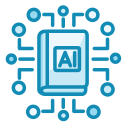This website uses cookies so that we can provide you with the best user experience possible. Cookie information is stored in your browser and performs functions such as recognising you when you return to our website and helping our team to understand which sections of the website you find most interesting and useful.
AI-Driven Assessment and Evaluation in Education
AI-driven assessment and evaluation are revolutionizing the education sector by introducing intelligent technologies that offer personalized, efficient, and data-rich learning environments. Through machine learning, natural language processing, and advanced analytics, AI has the power to reshape how students are assessed and how educators interpret data for instructional improvement. Harnessing these capabilities enables educators to move beyond traditional assessment models, fostering a more holistic and responsive approach that meets the diverse needs of learners. This transformative shift not only enhances the accuracy and efficiency of assessments but also provides deeper insights into student progress, ultimately contributing to a more equitable and effective education system.
The Foundations of AI-Driven Assessment
Machine Learning Algorithms in Education
Natural Language Processing for Open-Ended Responses
Data Analytics in Continuous Evaluation
Personalized Learning and Adaptive Testing


